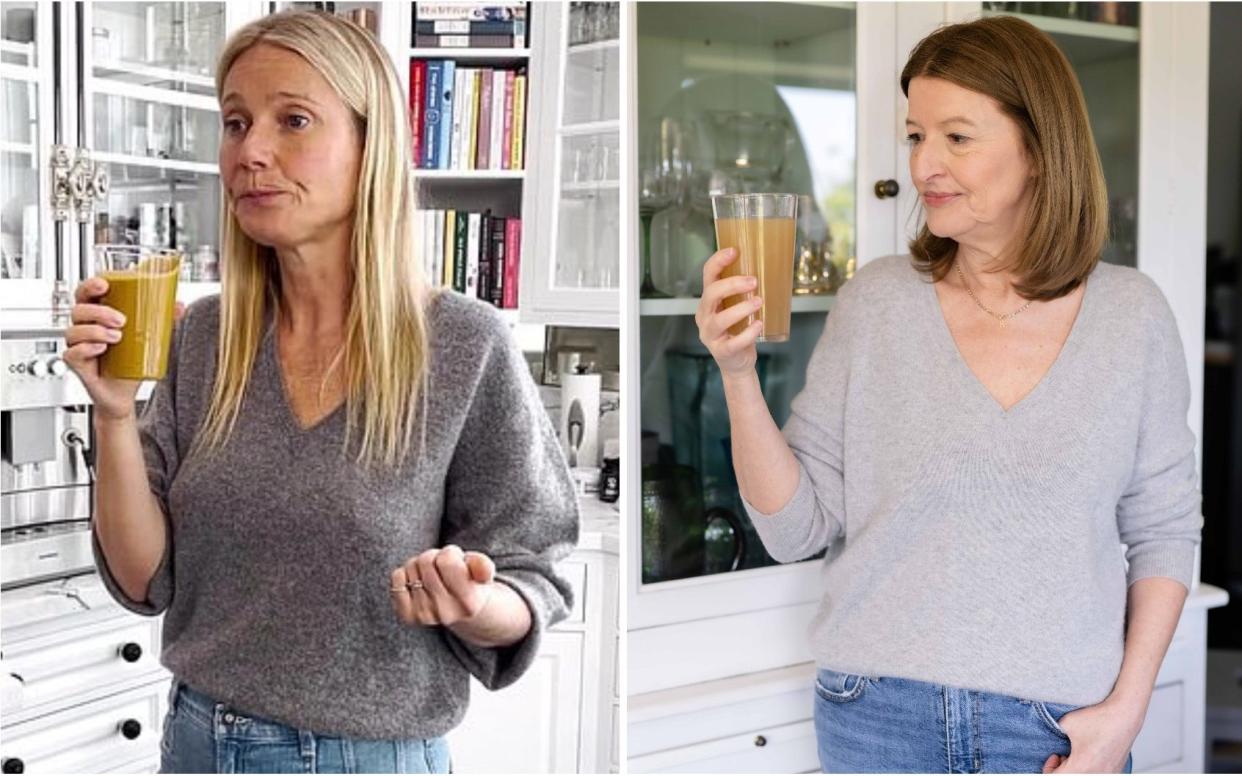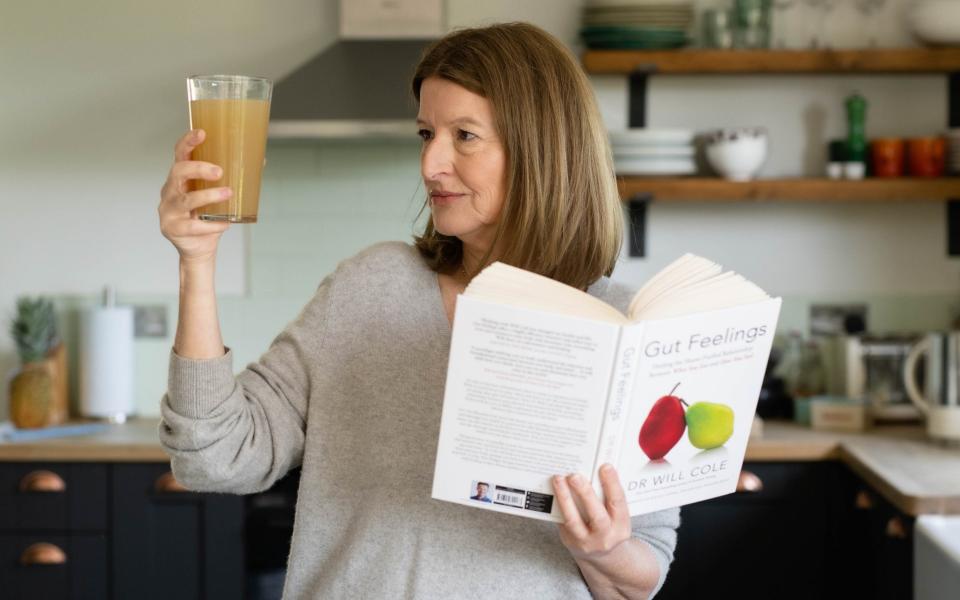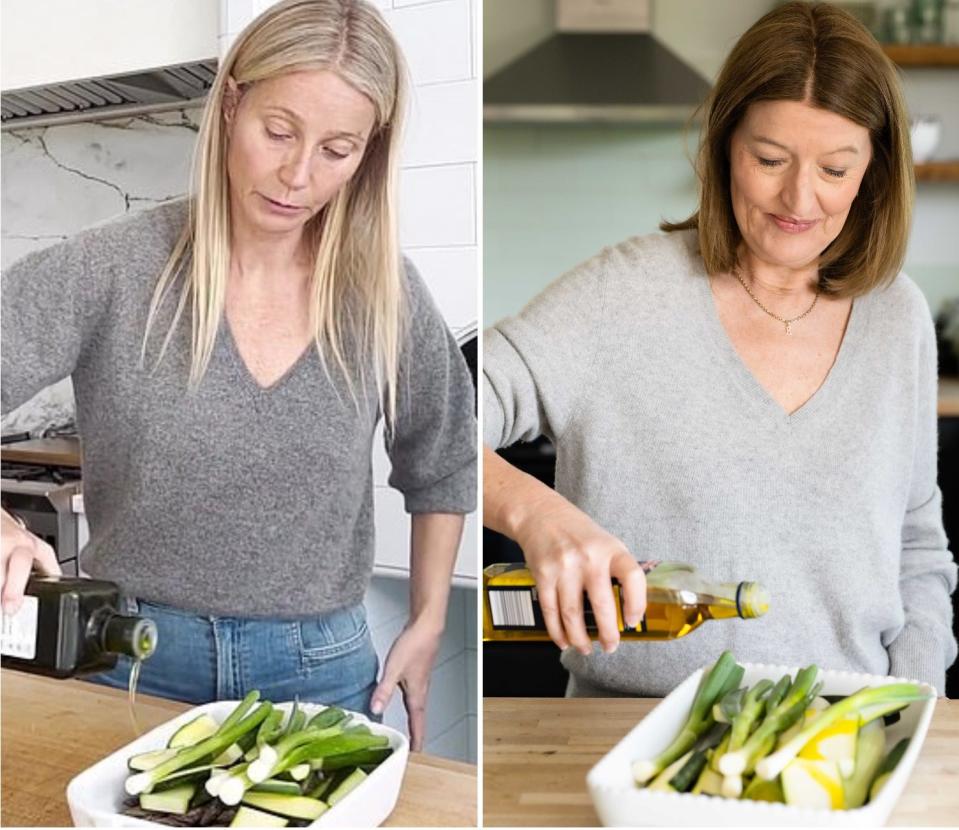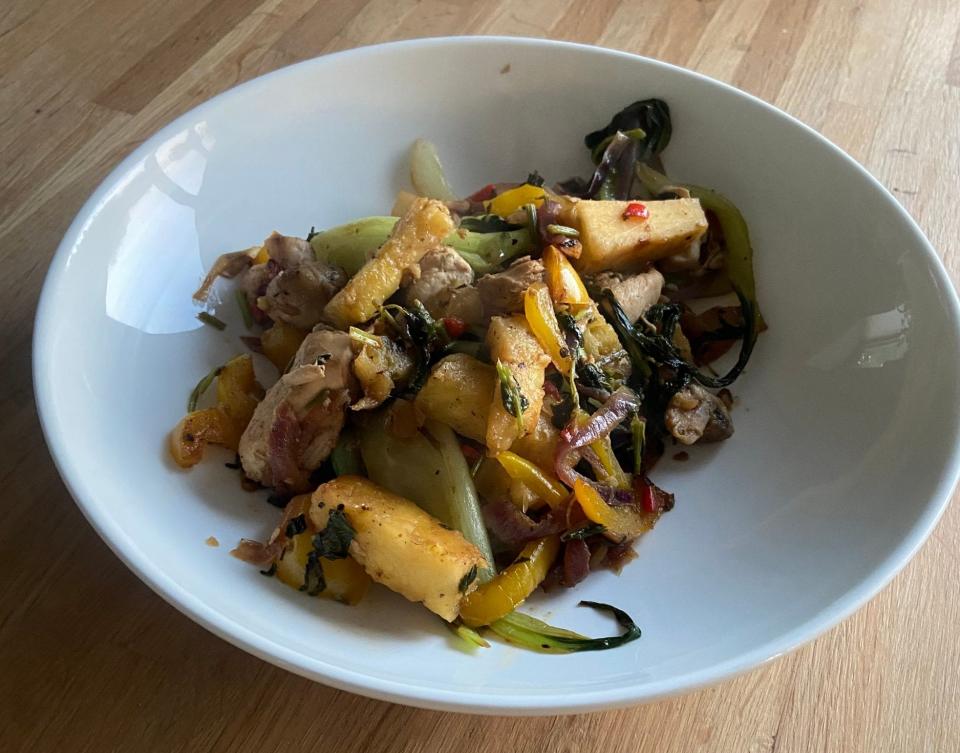I thought Gwyneth’s diet was nonsense – until I tried it

When Gwyneth Paltrow appeared on a podcast with “functional medicine practitioner” Dr Will Cole in March, the internet erupted with outrage. Following Paltrow’s breezy description of her daily wellness routine, and her meal plan of bone broth and vegetables, critics claimed she was promoting a “starvation diet”.
A few weeks later, 50-year-old Gwynnie stole the headlines when she picked up an award for her G Label fashion brand, wearing a revealing nude-coloured crop top. Predictably, this was followed by several articles on how to get a toned core, whatever your age.
The connection between the two stories – low-calorie diet = ability to wear crop top – wasn’t immediately made, but the correlation is obvious. Paltrow credits her good health to Cole, host of The Art of Being Well podcast and the author of The Inflammation Spectrum and bestseller Intuitive Fasting – and his new book, Gut Feelings.
“Working with him has changed my health and life,” she says of him. So who is Cole, and what are his methods?
Cole’s LinkedIn profile describes him as a functional medicine practitioner at Cole Natural Health Centers in Monroeville, Pennsylvania. But a closer look reveals he isn’t actually a doctor of medicine but a chiropractor who specialises in investigating the underlying factors of chronic disease, autoimmune conditions, hormonal imbalances and digestive disorders.
Functional medicine claims to take a more holistic approach to health, with the aim of uncovering the root cause of illness, focusing on lifestyle changes, nutrition and anxiety, instead of simply covering up symptoms with medication. We all know that a bad diet and stress can make us both physically and mentally ill and Gut Feelings explores why – delving into the science of inflammation and gut issues that can lead to depression, mood swings and many common health conditions. The importance of gut health to our general health and wellbeing is becoming more evident and Cole’s latest book explains how the gut and brain are connected and why your emotional health influences your physical health.

The science is complex, but the topic is not. We’ve all experienced butterflies on a first date or felt nerves in the pit of our stomach when stepping into the unknown. This is the gut-brain connection in action. “Trust your gut”, “gut instincts”, “I can feel it in my gut” are all sentiments that come from the age-old understanding that we have a sixth sense in our gut. Cole explains that “the nutrients we eat are what the bacteria in our gut feed on. These bacteria communicate directly with our brain by producing neurotransmitters like dopamine and serotonin, which largely regulate our mood and emotions.” So, a strong connection can be made between what you eat and how you feel.
Faced with a backlash following Paltrow’s appearance on his podcast – some dieticians claimed she was promoting disordered eating – Cole immediately leapt to his client’s defence. She was the healthy one, he argued. Society’s response to her food choices is what’s really causing the problems.
“I think hyperventilating over people intermittent-fasting and drinking bone broth is why we are faced with a society where the vast majority of people struggle with metabolic issues, type 2 diabetes – lifestyle-driven things,” Cole, 39, declared.
“You can’t really deny that obesity is implicated in a shorter, sicker life. We need to have conversations about this. It doesn’t mean people have to be stick-thin or a waif; it just means they need to be the healthiest version of themselves,” he added.
But would anyone actually want to live like Gwyneth out here in the real world – where wearing a crop top isn’t top of most of our priorities – and is there anything to be learned from Cole’s methods? I decided to find out.
Taking responsibility for my own gut health
Being averse to both starving to lose weight and anything even remotely woo-woo, I read Gut Feelings with a heavy dose of scepticism.
With all the brouhaha over Gwyneth’s wellness routine, I was expecting the book to be a joyless ode to the weight-loss properties of bone broth. But once I’d got past the loopy encouragements – “the goal of this book is to learn that wellness is a sacred art, and you are the masterpiece” – I found it interesting and actually quite inspiring. Believe it or not, Cole talks a lot of sense.
The challenge with gut health is it’s a complicated science, and improving the health of your gut microbiome – the bacteria that live in the gut – involves taking responsibility for your own health by avoiding junk foods, sugar and excess stress – not easy in modern society. The book breaks it down to a 21-day plan where each day you focus on an intention or an action.

On day one, the book suggests you think about a food that doesn’t make you feel good (dairy could make you constipated, for instance) and how you could eat less of it; day two is about avoiding snacking; day three is a sugar audit; day seven encourages fermented foods, and so on.
It’s not just about food; you are also encouraged to slow down, break up with your phone and get out into nature. There’s also a section dedicated to the importance of movement – of both the physical and the bowel kinds. Yes, it’s good to move more and, yes, you need fibre. None of it is groundbreaking or revelatory, but I still found it inspiring, and the connection Cole makes between what you eat and how you feel does make sense.
There is no strict diet to follow, although there are recipes and suggestions of what you should and shouldn’t eat to encourage optimal gut health. It left me determined to get my sugar cravings under control.
Of course, this approach to healing has its critics. Although Cole insists that he works alongside conventional medicine rather than against it, he also states that conventional doctors are not adequately trained in nutrition or psychology so focus on treating the symptoms of illness with medication rather than uncovering the root cause. He points out that 60 per cent of Americans have a chronic disease, almost half the population of the US has either pre-diabetes or diabetes, and depression is now the leading cause of disability around the world.
He says, “Most Americans take at least one medication a day, with mainstream medicine trained to diagnose a disease and match it with a corresponding medication. Meanwhile, the drug industry is funding much of the scientific research we read today.” He asserts that functional medicine practitioners are not anti-medication and “recognise that many people are alive because of advances in modern medicine”, but you can see where conflict between the two approaches to treatment arises.

Cole is keen to put an end to what he describes as food wars – diet culture versus anti-diet culture – saying, “On one side the diet culture implies you aren’t good enough unless you’re perpetually on a diet and work out obsessively. On the other, you have an anti-diet culture that may be well-intentioned, but in the name of body positivity, falls into the trap of suspending health logic. Unfortunately, both sides often result in a person feeling unwell, shamed and stressed.”
None of this is beneficial for the gut. Cole says feelings of shame are so toxic, he has coined the phrase “shameflammation” to describe the harmful inflammation that stress and emotional suffering can cause, leading to all sorts of mental health problems like anxiety, brain fog and depression.
He also decries the pressure of perfectionism, which he says is particularly “dangerous in the world of health and wellness”, where striving for the perfect lifestyle and showing it to the world on social media is at odds with the reality of our messy lives.
A girl can’t live on bone broth alone
When I started reading the book, I got into the spirit of research by following Gwyneth’s diet for four days. You won’t be surprised to learn that I felt ravenous.
I already do intermittent fasting: I have dinner before 8pm and then eat my first meal the next day at 12.30pm. I find it quite easy and it has helped me lose weight. But normally I would have a proper lunch. Bone broth doesn’t quite cut it when you’re looking forward to something tasty.
Don’t get me wrong, there is nothing wrong with bone broth. Chicken soup has a place in many cultures as a healing food, and a simple broth is often recommended to those suffering from irritable bowel syndrome and inflammatory bowel disease. It’s high in protein and other nutrients, benefits digestive health, helps build muscle and bones, and makes you feel surprisingly full.

The downside is that it’s a faff to make – 12 hours of boiling bones! – and your family are likely to think you’ve gone mad. I felt uncomfortable eating so little in front of my 23-year-old daughter. Gwyneth was criticised online for setting a bad example to her 19-year-old daughter Apple during the bone broth fuss, and I didn’t feel I was encouraging healthy habits while I sipped my cup of thin liquid at home. I tried putting it in a bowl rather than a cup to make it feel like more of a meal, but that reminded me of those prisoner-of-war films where the starving POW has to eat bugs and cockroaches to supplement the meagre soup they’ve been given.
After four days of doing this, followed by a sad dinner of solitary vegetables, I came to the line in the book, “We shouldn’t normalise restriction or dieting” and switched to Cole’s more satisfying approach. His recipes are, of course, designed to promote gut health and therefore don’t include sugar, dairy or refined carbs, but they were enticing enough to get my husband to eat them too. We enjoyed Thai-style chicken stir-fry, patatas bravas with scrambled eggs and greens, and Moroccan-inspired lamb burgers (no bun, naturally).
After a week of following the Gut Feelings plan, I do feel pretty good – although any diet that restricts alcohol, carbs and sugar is likely to make you feel better. And yes, I have lost weight. I started at just over 10st and now weigh 9st 7lb. Was it worth it? Well, I can’t see myself boiling bones too often in the future, and my husband says he never wants to hear Gwyneth Paltrow’s name again. Let’s put it this way: I finished following the plan on a Friday and that night we cracked open a bottle of red wine. Rather than order a pizza, though, we made the Moroccan burgers. Dr Cole would approve.
Kath’s creations from ‘Gut Feelings’
Moroccan-inspired lamb burgers
No burger bun, as Cole’s plan restricts refined carbs.

Thai-style chicken stir-fry
Plenty of veg, but unlike Gwyneth’s, alongside chicken.



